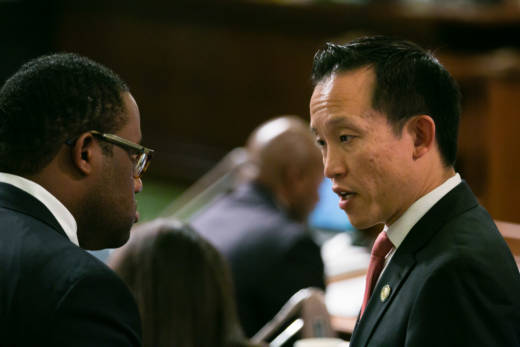Surveys, including those conducted by the U.S. Census Bureau, have shown Black and Latinx renters overwhelmingly would bear the brunt of evictions.
Many still fear a wave of evictions is imminent.
Even lawmakers voting to approve the tenant relief act publicly said it wouldn’t protect enough renters or do enough to relieve small-time property owners facing foreclosure.
“By no stretch of the imagination is the end-all-be-all” solution, said state Sen. Steven Bradford, D-Gardena, during a floor vote for the bill Monday. But he begrudgingly backed the bill, he said, because “this protects tenants hurt by COVID-19 without writing a blank check.”
One of the bill’s key authors, Assemblymember David Chiu, D-San Francisco, responded to those criticisms.
“I will be the first to say this bill is far from perfect,” Chiu said in an Assembly housing committee Monday night. He also said many of the tenant protections “I first fought for” in his previous eviction moratorium bill “are not in this bill.”
But, he added, “we cannot allow evictions to resume while we are still in the middle of a pandemic.”
As KQED previously noted, here are the main provisions of the COVID-19 Tenant Relief Act of 2020:
- Full protections: Any rent missed between March 1 and Aug. 31 will be converted to civil debt. This means landlords can take tenants to small claims court for any missed rent — but they can’t evict you for not paying it.
- Protections with a caveat: Rents missed between Sept. 1 and Jan. 31 are a different story, however. Tenants must pay 25% of rent within that period or else they’ll be open to eviction. The remaining 75% of their rent is treated as a civil debt, just like the provision for missed rent from between March 1 and Aug. 31.
- More time: Also under the new law, the usual three-day notice to evict that landlords post – mandatory before they go through the court process to evict a tenant – is now a 15-day-notice.
- How to file: Once a landlord has posted a 15-day notice, a tenant can file with their landlord that they have a pandemic-related hardship.
While tenants advocates hoped for a true statewide eviction moratorium, what eventually emerged were eviction protections targeted at more narrow situations — chiefly, rent nonpayment.
In an open letter to Newsom, The Alliance of Californians for Community Empowerment, a housing advocacy group, argued the tenant relief act should ban all kinds of evictions, forgive unpaid rent for tenants who cannot afford it and should have established a landlord relief fund.
Many of the bill’s key concessions came after pressure from the California Apartment Association, which represents landlords. The banking industry also forced the removal of mortgage forbearance provisions, which were at one time included in the bill to help property owners who may be suffering because their renters are falling behind.

